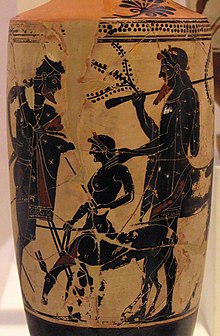Precepts of Chiron
Appearance

The Precepts of Chiron (Template:Lang-grc) is a now fragmentary Greek didactic poem that was attributed to Hesiod during antiquity. The poem was presented in the voice of Chiron, the wise centaur, as he instructed a young Achilles.[1] To judge from the few fragments that are preserved in other ancient authors, the hero's lessons consisted of moral, religious and practical advice.[2] As such, the poem shows affinities not only with the Hesiodic Works and Days,[3] with which it shared its hexameter verse form, but also with the gnomic elegies of Theognis.[4]
Select editions and translations
Critical editions
- Hesiodi, Eumeli, Cinaethonis, Asii et Carminis Naupactii fragmenta, Guil. Marckscheffel (ed.), Lipsiae, sumtibus Fr. Chr. Guil. Vogelii, 1840, pp. 370-1.
- Hesiodi carmina, Johann Friedrich Dübner (ed.), Parisiis, editore Ambrosio Firmin Didot, 1841, p. 61.
- Rzach, A. (1913), Hesiodi Carmina (3rd rev. ed.), Leipzig, ISBN 3-598-71418-1
{{citation}}: External link in|title= - Merkelbach, R.; West, M.L. (1967), Fragmenta Hesiodea, Oxford, ISBN 0-19-814171-8
{{citation}}: CS1 maint: location missing publisher (link). - Merkelbach, R.; West, M.L. (1990), "Fragmenta selecta", in F. Solmsen (ed.), Hesiodi Theogonia, Opera et Dies, Scutum (3rd rev. ed.), Oxford, ISBN 0-19-814071-1
{{citation}}: CS1 maint: location missing publisher (link).
Translations
- Evelyn-White, H.G. (1936), Hesiod, the Homeric Hymns, and Homerica, Loeb Classical Library, vol. no. 57 (3rd rev. ed.), Cambridge, MA, ISBN 978-0-674-99063-0
{{citation}}:|volume=has extra text (help); External link in|title= - Most, G.W. (2006), Hesiod: Theogony, Works and Days, Testimonia, Loeb Classical Library, vol. no. 57, Cambridge, MA, ISBN 978-0-674-99622-9
{{citation}}:|volume=has extra text (help)CS1 maint: location missing publisher (link). - Most, G.W. (2007), Hesiod: The Shield, Catalogue, Other Fragments, Loeb Classical Library, vol. no. 503, Cambridge, MA, ISBN 978-0-674-99623-6
{{citation}}:|volume=has extra text (help)CS1 maint: location missing publisher (link).
Notes
- ^ Pausanias 9.31.5.
- ^ Most (2006, p. lxii), West (1978, p. 23).
- ^ Friedländer (1913, p. 571).
- ^ Cingano (2009, p. 128).
Bibliography
- Cingano, E. (2009), "The Hesiodic Corpus", pp. 91–130
{{citation}}: Missing or empty|title=(help); Unknown parameter|editors=ignored (|editor=suggested) (help). - Friedländer, P. (1913), "Ὑποθῆκαι", Hermes, 48: 558–616, JSTOR 4473419.
- Montanari, F.; Rengakos, A.; Tsagalis, C. (2009), Brill's Companion to Hesiod, Leiden, ISBN 978-90-04-17840-3
{{citation}}: CS1 maint: location missing publisher (link). - Schwartz, J. (1960), Pseudo-Hesiodeia: recherches sur la composition, la diffusion et la disparition ancienne d'oeuvres attribuées à Hésiode, Leiden
{{citation}}: CS1 maint: location missing publisher (link). - West, M.L. (1966), Hesiod: Theogony, Oxford, ISBN 978-0-19-814169-3
{{citation}}: CS1 maint: location missing publisher (link). - West, M.L. (1978), Hesiod: Works & Days, Oxford, ISBN 0-19-814005-3
{{citation}}: CS1 maint: location missing publisher (link).
